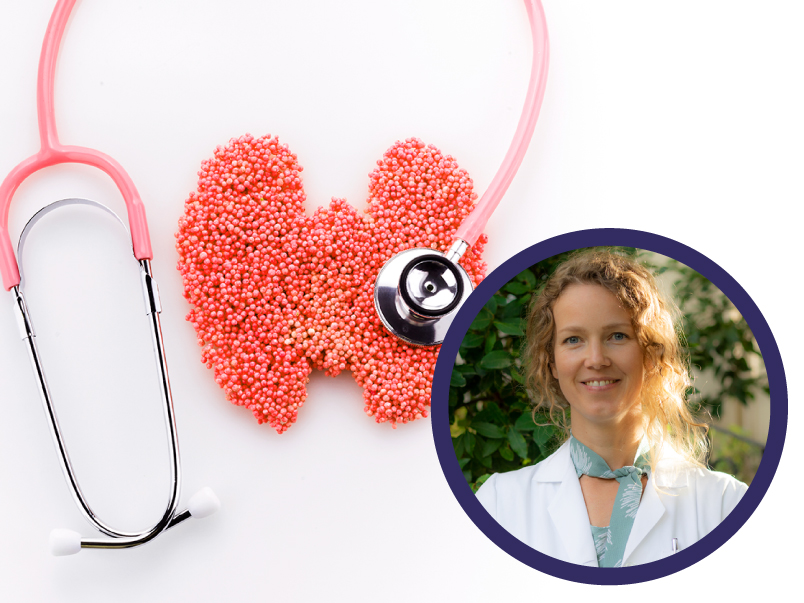blog tambre
What are thyroid disorders during pregnancy?

Table of contents
We are happy to communicate that we have a new doctor at Tambre she is Bianca Van der Zee from the Netherlands, and she attends English and Dutch-speaking patients.
Dr. Bianca completed her medical studies in 2013 and in 2017 she graduated as a Family Doctor from the Erasmus University in Rotterdam. Later, because of her interests she specialized in Gynecology and Fertility.
Bianca told us that from the first moment she felt integrated by the entire team and highlights the passion and effort that all our professionals make to achieve the best results. “From the first day I felt so welcome here, everyone is very helpful to me and to our patients. I would say this team is passionate and hard-working to obtain the best.”
We have just talked with her about a topic which our patients have a lot of uncertainty. Bianca has told us a lot of things about thyroid disorders during pregnancy. Let’s know!
What is the thyroid and its role in our body?
Our thyroid is a small, butterfly-shaped gland located at the front of the neck. It’s a part of our endocrine system and controls many of our body’s important functions by producing hormones (T4 and T3).
How do thyroid disorders affect fertility?
Hypothyroidism (the thyroid does not produce enough hormones) and hyperthyroidism (produces too much of the hormones) are associated with disrupted menstrual cycles and subfertility, tell us Bianca. Research also suggests that it might be associated with poorer outcomes during fertility treatment.
Thyroid dysfunction is reversible and hormonal treatment is generally safe and may exert a positive effect on fertility. Therefore, it is reasonable to treat overt thyroid dysfunction in infertile women, with the goal of normalising thyroid function.
What happens with the thyroid during pregnancy?
During pregnancy, the thyroid gland increases in size by 10%-40% and the production of the hormones increases by nearly 50% along with a similar increase in total daily iodine (nutrient required for thyroid hormone production) requirements.
Maintaining a normal level of thyroid hormones during pregnancy is crucial for normal development of a baby’s brain and nervous system.
Thyroid disease is the second most common endocrine disorder after diabetes in pregnancy.
What are the risks of a suboptimal or untreated thyroid disorder during pregnancy?
Untreated hyper- or hypothyroidism during pregnancy can lead to miscarriage, premature birth, low birthweight, preeclampsia, (a dangerous rise in blood pressure), thyroid storm.
Other risks would be a sudden severe worsening of symptoms, congestive heart failure, anaemia, and stillbirth. All that is why it requires close monitoring and treatment as warranted.
Should every woman who tries to get pregnant be tested for her thyroid function?
In patients seeking pregnancy, or newly pregnant, hormonal blood testing is recommended in an history of thyroid disorder or current symptoms/signs of thyroid dysfunction, history of head or neck radiation or prior thyroid surgery.
Also, we must monitor women aged 30 or below, type 1 diabetes or other autoimmune disorders, history of pregnancy loss, preterm delivery, or infertility, multiple prior pregnancies (minimum 2), family history of autoimmune thyroid disease or thyroid dysfunction, Morbid obesity (BMI ≥40 kg/m2), use of amiodarone or lithium, or recent administration of iodinated radiologic contrast, residing in an area of known moderate to severe iodine insufficiency.
What are the symptoms of a hyper- or hypothyroidism during pregnancy?
Some signs and symptoms of hyperthyroidism often occur in normal pregnancies, including faster heart rate, trouble dealing with heat, and tiredness.
Other signs and symptoms can suggest hyperthyroidism: fast and irregular heartbeat, shaky hands, unexplained weight loss or failure to have normal pregnancy weight gain.
Symptoms of an underactive thyroid are often the same for pregnant women as for other people with hypothyroidism. Symptoms include extreme tiredness, trouble dealing with cold, muscle cramps, severe constipation, problems with memory or concentration.
Most cases of hypothyroidism in pregnancy are mild and may not have symptoms.
Do pregnant women need a different diet in order to maintain a normal thyroid function?
The U.S. Institute of Medicine recommended dietary allowances to be used as goals for individual total daily iodine intake (dietary and supplement) are 150 μg/d for women planning a pregnancy (optimally started 3 months in advance). The WHO recommends 250 μg/d for pregnant and lactating women.
Iodine is primarily derived from the diet and from vitamin/mineral preparations.
Good sources of iodine are dairy foods, seafood, eggs, meat, poultry, and iodized salt—salt with added iodine. Experts recommend taking a prenatal vitamin with 150 micrograms of iodine to make sure you’re getting enough, especially if you don’t use iodized salt.
Sustained iodine intake from diet and dietary supplements exceeding 500 μg daily should be avoided during pregnancy due to concerns about the potential for fetal thyroid dysfunction.
Thank you , Bianca, for answering questions that many people ask about this issue. We are honoured to have such dedicated and involved professionals at Tambre.
